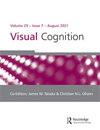在翻译中发现:在本地化任务中观察绑定效果的响应映射的作用
IF 1.4
4区 心理学
Q3 PSYCHOLOGY, EXPERIMENTAL
引用次数: 6
摘要
摘要根据动作控制理论,将反应和刺激的特征集成到事件文件中。重复事件文件的任何组件都会检索以前绑定的信息,这有利于完全重复,但会干扰部分重复。然而,这种“绑定效应”在本地化性能中是不存在的。通过假设在视觉搜索中假设的顺序处理步骤直到响应执行,我们假设,对于定位,参与者可以在不需要处理目标特征的情况下执行他们的响应。因此,后选择性加工可能对结合效应的出现至关重要。在这里,参与者在两种响应条件下定位出现在触摸板四个角之一上的彩色目标,即直接敲击目标(直接响应映射)和敲击与目标相反的角对角线(平移响应映射)。只有翻译反应映射产生了定位反应和颜色之间的结合效应。相反,直接反应映射显示了一种效果,这种效果可以通过(非空间)抑制回报或相关的变化效益效应来更好地解释。我们得出的结论是,基于将空间特征转换为非直接空间响应的任意响应映射,即使在定位任务中也会导致绑定效应。本文章由计算机程序翻译,如有差异,请以英文原文为准。
Found in translation: The role of response mappings for observing binding effects in localization tasks
ABSTRACT According to action control theories, response and stimulus’ features are integrated into event files. Repeating any of an event file’s components retrieves the previously bound information, causing benefits for full repetition, but interference for partial repetition. Yet, such “binding effects” are absent in localization performance. By assuming sequential processing steps until response execution as assumed in visual search, we hypothesized that, for localization, participants can execute their response without the need to process target features. Hence, post-selective processing might be crucial for binding effects to emerge. Here, participants localized coloured targets appearing on one of four corners of a touchpad in two response conditions, namely, directly tapping on the target (direct response mapping), and tapping on the corner diagonal opposite to the target (translational response mapping). Only the translational response mapping yielded binding effects between localization response and colour. The direct response mapping instead showed an effect that is better explained by (non-spatial) Inhibition of Return or related change benefit effects. We conclude that an arbitrary response mapping – based on a translation of a spatial feature into a non-direct spatial response – can lead to binding effects even in localization tasks.
求助全文
通过发布文献求助,成功后即可免费获取论文全文。
去求助
来源期刊

VISUAL COGNITION
PSYCHOLOGY, EXPERIMENTAL-
CiteScore
4.20
自引率
10.00%
发文量
29
期刊介绍:
Visual Cognition publishes new empirical research that increases theoretical understanding of human visual cognition. Studies may be concerned with any aspect of visual cognition such as object, face, and scene recognition; visual attention and search; short-term and long-term visual memory; visual word recognition and reading; eye movement control and active vision; and visual imagery. The journal is devoted to research at the interface of visual perception and cognition and does not typically publish papers in areas of perception or psychophysics that are covered by the many publication outlets for those topics.
 求助内容:
求助内容: 应助结果提醒方式:
应助结果提醒方式:


